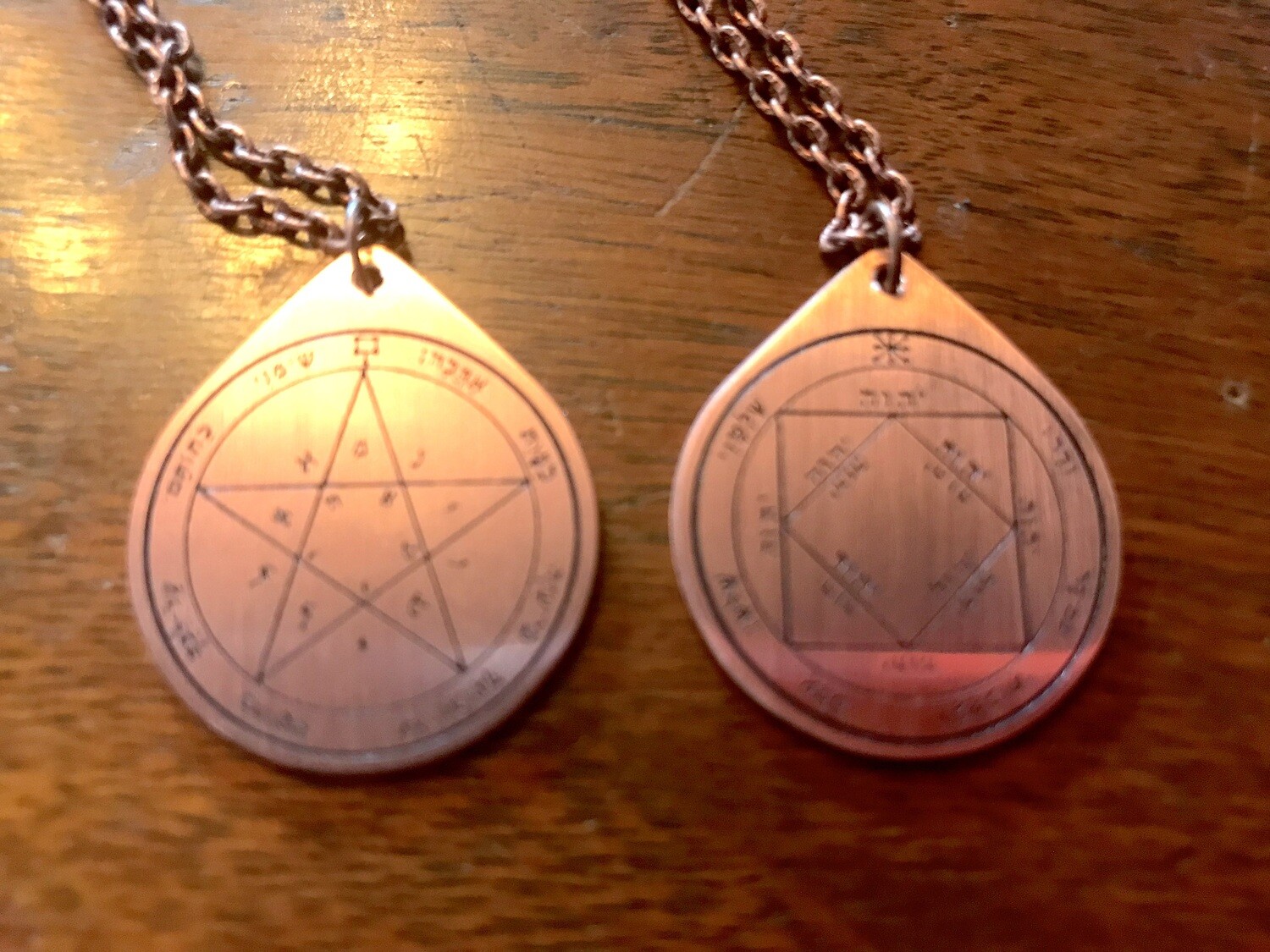
Hire Me! Business Success Pentacle
Featuring the Lover's Pentacle on one side and the Twelvefold Name of G-d on the other, this combination pentacle rallies the forces of Venus and the Sun to help you shine. I recommend this combination pentacle for any situation where you’re trying to impress someone with how responsible, competent, and charming you are. It’s especially good for job interviews, performance reviews, court appearances, or similar situations where you want to impress an authority figure. It’s also good for when you are the authority figure, and you want to add a glimmer of glory to your aura. It’s also excellent for sales calls. For most situations, I recommend carrying it in a breast pocket if possible, or tucked into your bra. It is also good permanently installed in an office; under the seat of your desk chair is one good option.
The Lover’s Pentacle (2nd Venus)
Mathers says that this pentacle is used for “obtaining grace and honor, and for all things which belong unto Venus, and for accomplishing all thy desires herein.” In this combination, it’s used to make people like you, and to project an aura of grace and honor.
The versicle around the circumference is the first part of Song of Songs 8:6. “Set me, as a signature, on your heart, on your arm, for as strong as Death is Love.”
Outside the pentagram, starting at the bottom and reading counter-clockwise (the natural way to arrange Hebrew around a circle), we have יענאל (Yonel). This is almost certainly a variant of יוֹנָה אל (Jonah El). יוֹנָה (Jonah) means “dove” and is common as a proper name. For example, the biblical prophet who got swallowed by a big fish was named יוֹנָה. The name means something like “Dove of El”, or “God of Doves”. This is a very apt name for a spirit of Venus, who is commonly and closely associated with doves. This is the name that carries your wishes out into the world, and brings messages back to you, like a homing pigeon.
Inside the points, again counterclockwise from the bottom, we have עימאל (Aimel). This is related to the Arabic proper name اِيمِلْ (Aimal); they both mean “Wished for”. I translate עימאל as “The Wishing God”, although other people would probably choose “Wish of El” or “What El Wishes For”. This is the name that makes your wishes come true.
The inner name is trickier. Reading counterclockwise from the top right, and using א at both the beginning and the end gives us אהויעא (Ahavia). This is an obscure Hebrew god name which is very closely related to the more familiar god-name אהבה. The name אהבה (Ahavah) is usually translated as "Love". I was tempted to stop translating there, but then I learned something interesting....
In the days of Ezra the prophet, Ahaviah was also the name of a specific place in the world, a canal or river. (Ezra 8:21). “Ahava was both a town and a river... It is famous for its bitumen springs, and is situated on the Euphrates, at a distance of about 80 miles from Babylon, toward the northwest.” Bitumen of Judea had many uses in the ancient world. It was used in mummification. It's in some kyphi recipes (but not mine). It was used to coat scrying mirrors. It smells like rain hitting hot asphalt. Today, it is primarily used as a medium for capturing light on paper. I believe the third spirit named on the 2nd pentacle of Venus is named, in English "bitumen of Judea", and that is the incense with which I charge this pentacle.
The Twelvefold Name of G-d (Sun #3)
Mathers says of this pentacle that it is used to “to acquire kingdom and empire, to inflict loss, and to acquire renown and glory”. In this context, we’re using it primarily to acquire renown and glory, as well as to solidify our standing as someone worthy of kingdom and empire.
The versicle around the circumference is שלטני שלטן עלם ומלכותי עם דר ודר This is an unusual spelling of שָׁלְטָנֵהּ שָׁלְטָן עָלַם, וּמַלְכוּתֵהּ עִם-דָּר וְדָר, which is the last bit of Daniel 4:31. In English, it says, “Their dominion rules forever, and Their kingdom from generation to generation.”
Within are interlaced squares, and the Most Holy Name, repeated twelve times. We talked extensively about the symbolism of the number 12 in the Mercury chapter, when we discussed the All Knowing Dodecagram. Broadly, the number four, and squares in particular, represent stability and dominion, and that is their function here as well. The Holy Name, which we discussed when we learned with the first lunar pentacle, emphasizes the stability and power of fourness.
